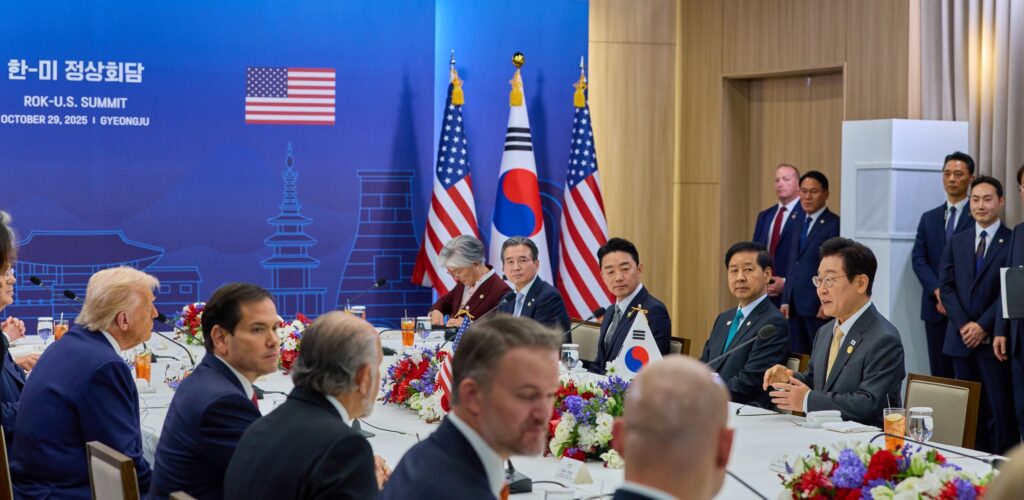The Peninsula
Canada’s Ad, China’s Audit, and South Korea’s Trade Deal

The United States’ latest trade actions against Canada and China have injected new economic policy uncertainty. On October 23, President Donald Trump abruptly halted trade discussions with Canada in response to the province of Ontario airing an advertisement criticizing the U.S. tariffs. Two days later, on October 25, Trump announced that there would be an additional 10 percent levy on Canadian exports to the United States. In the meantime, the Office of the U.S. Trade Representative (USTR) opened an investigation on October 24 to determine whether China has fully implemented its Phase One commitments from President Trump’s first term to reduce the trade imbalance. While further details may shift in the aftermath of the Asia-Pacific Economic Cooperation (APEC) summit, this piece focuses on the broader implications for the ongoing U.S.-Korea trade talks.
Tariffs by Any Legal Means
The USTR investigation into China’s compliance with the Phase One agreement highlights how the United States can pursue new tariffs regardless of the Supreme Court’s pending ruling on the International Emergency Economic Powers Act (IEEPA). The IEEPA case was going to indicate whether courts would uphold the administration’s tariff authority. However, by opening a USTR investigation under separate legal foundations, mostly targeting the Section 301 tariffs, the Trump administration has demonstrated that future tariff actions can be legally justified through alternative pathways.
The lesson for Korea is that the outcome of the IEEPA case will not have a significant impact on future trade deals with the United States because a wide range of legal arguments can be invoked to support tariff measures. As the rules governing trade become more flexible, tariffs can be reintroduced quickly, applied unpredictably, and justified through multiple legal pathways. Thus, tariffs are here to stay. The takeaway should be that the tariff exposure is a structural feature of the new global economic environment, not a temporary episode.
No Ally Is Immune
The abrupt suspension of negotiations with Canada illustrates how personal feelings can affect diplomatic progress. The speed at which talks between the United States and Canada shifted from constructive to confrontational suggests that even close allies are vulnerable when trade policy becomes personalized. The political mood of the moment enters as an unpredictable risk factor. For policymakers in Korea, the takeaway should be that institutional goodwill alone cannot be assumed to protect allies from sudden shifts in U.S. tariff announcements. While the U.S.-Korea alliance remains broadly stable, periodic anti-U.S. rhetoric in Korean political discourse can take on outsized significance in a more personalized trade environment.
Negotiating at Different Speeds
These developments have significant implications for U.S.-Korea trade negotiations. As the Trump administration has shown a tougher posture toward Canada and China, a high-profile agreement with Korea carried increased political value. U.S. officials had a strong desire to conclude a deal with Korea for this reason. In contrast, Korea maintained a more cautious tone. For instance, President Lee noted in a that negotiations were taking some time as he sought a more rational deal, suggesting that Korea was pursuing a durable outcome over headline momentum. This discrepancy in urgency for a deal between the two countries may have shaped the scope of the concessions in the final agreement, where Korea was able to come away with a reasonable deal.
Policy Uncertainty as a Structural Risk
The most consequential takeaway from recent events involving Canada and China is the negative effects of economic policy uncertainty. Daily fluctuations in tariff threats, negotiations, and investigations create noise that complicates investment planning and business decisions in the long run. This policy uncertainty can deter cross-border investment activities and reduce investor confidence, ultimately weighing on global growth. Even though the U.S.-Korea trade deal was successfully concluded, it would not eliminate the possibility of future friction. Any subsequent USTR investigation could identify trade and currency imbalances and justify new punitive measures, effectively negating the agreement. In this current environment, trade deals are inherently fragile, and policy uncertainty can erode their long-term value.
Conclusion
The United States’ latest trade actions against Canada and China are not isolated events. They represent a pattern in which tariffs are enduring, legal rationales are flexible, personal sensitivities can derail progress, and policy uncertainty has become persistent. For Korea, recognizing these structural dynamics will be essential to navigate the next phase of global trade realignment.
Sunhyung Lee is a Non-Resident Fellow at KEI and an Assistant Professor of Economics at the Feliciano School of Business, Montclair State University. The views expressed here are the author’s alone.
KEI is registered under the FARA as an agent of the Korea Institute for International Economic Policy, a public corporation established by the government of the Republic of Korea. Additional information is available at the Department of Justice, Washington, D.C.
